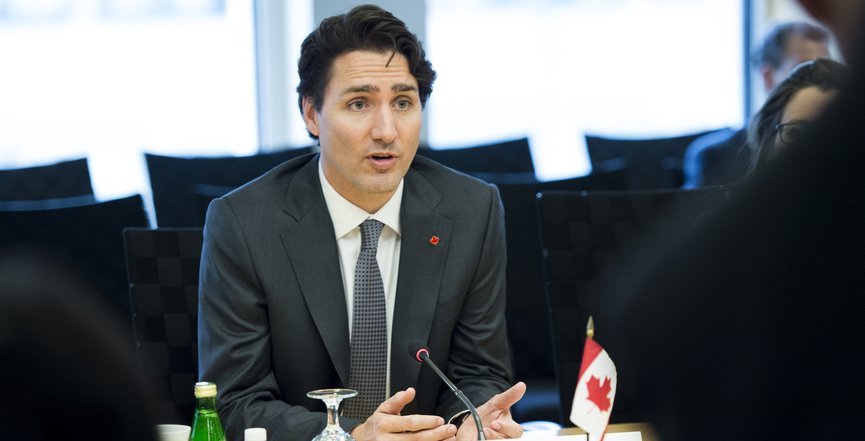A major promise of Justin Trudeau’s Liberals in 2015 was to put Canada back on the international stage. The Liberals judged that Canadians wanted to re-engage with the United Nations, not see the prime minister boycott the General Assembly. Canadians wanted blue-helmeted UN peacekeepers going abroad in place of metal-helmeted troops serving in U.S.-sponsored NATO missions.
As Jocelyn Coulon attests in his book Canada Is Not Back, Trudeau’s pledge to make Canada a player in international diplomacy was backed up by a team of five MPs and nine outside experts (including Coulon) who had identified the main issue: under Harper’s Conservatives, Canada had become isolated from the world’s major powers, and was playing no role with other middle powers.
Five years later, Canada remains isolated as the first-term Trudeau government exhausted its foreign policy energy in its efforts to keep NAFTA alive. Indeed, under Trudeau, new tensions developed with China, the world’s emerging super power, because Canada “fell into a trap set by Donald Trump,” as former Liberal prime minister Jean Chrétien put it.
By arresting Huawei executive Meng Wanzhou for extradition to the U.S. on doubtful charges of bank fraud, Canada took sides in a dispute over who would supply 5G telecommunications networks. The Trudeau government seemed surprised when in a tit-for-tat move China arrested two Canadians on even more doubtful grounds.
Sanctions imposed on Russia by Stephen Harper after the annexation of Crimea in 2014 are still in place, while former Liberal global affairs minister, Chrystia Freeland, injected new cold war rhetoric into relations with Russian President Vladimir Putin and his government. It appears building support among Canadian voters of Ukrainian ancestry supersedes international diplomacy for both Conservative and Liberal governments.
Canada still does not have diplomatic relations with Iran, a major player in the Middle East. Failing to resume normal diplomatic ties left the Liberal government acting from outside in mounting efforts to aid the grieving families of Canadian victims of the recent air catastrophe in that country.
Canada is sending military equipment to Saudi Arabia while it fuels a civil war in Yemen, yet relations with Saudi Arabia are rocky, thanks to a twitter outburst from Freeland.
Despite talking a good game on defending human rights, Canada has no diplomatic strategy in place to deal with human rights violations in countries like Iran, where academics are in jail, or Saudi Arabia, where women’s rights have yet to be meaningfully recognized.
Joining with a coalition of “like minded powers” to push human rights issues is the only viable option for dealing with authoritarian regimes. Acting alone may bring a headline for a day, but it also makes Canadians a target for reprisals, without resulting in any concrete changes.
Trudeau begins his second term as prime minister with a task left over form his first mandate: to assert Canadian presence abroad by seeking election for a two-year term on the United Nations Security Council, beginning in 2021.
To this end, Trudeau is traveling to Africa February 6 for a state visit to Ethiopia, where he will also be meeting leaders attending the 33rd African Union Summit. His next stop is Senegal, where he expects to discuss issues arising in “L’Organization internationale de la Francophonie,” and certainly how its 88 member states will line up in choosing between Norway, Ireland and Canada for a rotating seat on the Security Council.
African votes from Commonwealth countries used to be automatic for Canada. However, international development assistance has gone from being a priority under Lester B. Pearson to a victim of 40 years of austerity.
Harper shuffled the Canadian International Development Agency off to a corner of Global Affairs Canada.
Without a stand-alone agency able to advocate for international development (rather than for export promotion), Canadian spending on foreign assistance is likely to remain at 0.2 per cent of GDP, unlike Norway, which spends one per cent of its GDP — proportionally five-times more than Canada.
Ireland, Canada’s other rival for the security council seat, at least has a plan to reach one per cent.
Given its performance on the international stage, Canada should expect to get overlooked by African nations, despite any personal appeal Trudeau is able to generate.
At the end of his trip, Trudeau will do a star turn at the Munich Security Conference, where he will interact with European foreign ministers and leaders from around the world.
Canada has aligned itself closely with the U.S. in particular since the preamble to the 1988 Free Trade Agreement put a bilateral alliance on international affairs into an international treaty. Do other nations really want to hear American views echoed by a newly-elected rotating member of the Security Council?
If Trudeau has a real vision for how Canada can contribute an independent voice to the Security Council deliberations on international conflicts, now is the time to lay it out.
Duncan Cameron is president emeritus of rabble.ca and writes a weekly column on politics and current affairs.



